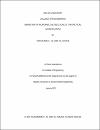Inhibition of Inorganic Oilfield Scales: Theoretical Investigation
| Advisor | Khraisheh, Majeda |
| Advisor | Hussein, Ibnelwaleed A. |
| Author | AL ABD AL HAMAD, MOHAMMAD J. |
| Available date | 2021-02-17T09:14:50Z |
| Publication Date | 2021-01 |
| Abstract | Scale deposition is a critical issue in the oil and gas exploration and production processes causing significant blocking in the tubing and consequently flow assurance and economic losses. Most studies addressing the scale formation have focused on the experimental impact of different variables on scale formation. At the start of this work, the formation and inhibition of inorganic oilfield scales such as iron sulfide, calcite, and barite scales theoretically was analyzed by using Density-Functional Theory (DFT) simulation. Molecular dynamics simulation and DFT calculation were used to investigate the inhibition effects of four different scale inhibitors polyacrylic acid (PAA), hydrolyzed polymaleic anhydride (HPMA), polyepoxysuccinic acid (PESA) and polyaspartic acid (PASP) on iron sulfide scale formation. After that, the inhibition of barite scale deposition was investigated by employing molecular simulation (VASP and DFT) for three different scale inhibitors namely: (Polyaspartic acid, PASP; Nitrilotrimethylenephosphonateand, NTPM; Dimethylenetriaminepenta (methylene-phosphonic acid), DETPMP). The selected inhibitors are widely used in the industry. Geometrical analysis were used to explore the inhibitors performance and visualize the outcomes. QSAR parameters were also used to predict the activity of the inhibitors in the system. . Binding energy calculation produced - 1.06 eV, -0.17 eV, and -2.33 eV for PASP, NTPM, and DETPMP, respectively. The results of this study indicated that the inhibition strength of the three inhibitors on barite scale formation can be sequenced as DETPMP>PASP>NTPM, which is in agreement with experimental observations. Moreover, the ecological toxicity properties were predicted, and the environmental impact of the different inhibitors assessed. All inhibitors showed comparable eco-tox properties, and predicted to be soluble in water. Molecular simulations proved to be an effective tool in the prediction of the performance and toxicity of barite scale inhibitors. |
| Language | en |
| Subject | Barite scale scale inhibitors Density functional theory QSAR Parameters Eco-tox Properties Geometrical Analysis |
| Type | Master Thesis |
| Department | Environmental Engineering |
Files in this item
This item appears in the following Collection(s)
-
Environmental Engineering [48 items ]


